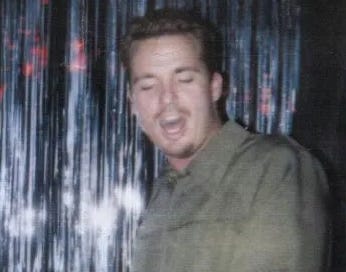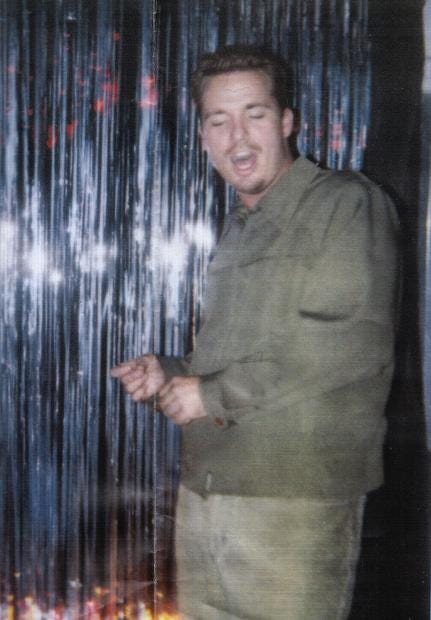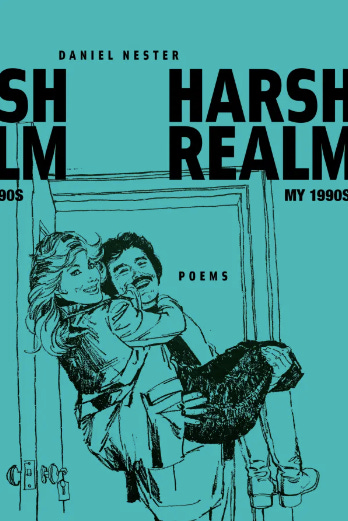I Met Liz Phair Once
Poems from Daniel Nester's new 90s collection, "Harsh Realm."
How did I end up writing a collection of 90s-themed poems? It wasn’t intentional, not exactly. Maybe it was just a matter of time. And age.
At the beginning of the 90s, I moved to New York City to get an MFA in poetry and was generally living the poet’s life. As the decade went by, I switched to nonfiction and swore off poems. By 2009, I’d had my Icarus moment, putting out a humorous essay collection that made its way onto the shelves of Urban Outfitters but was then critically panned. Stung, I withdrew. I edited a book of other people’s sestinas to keep busy. Then, I began to write more personal pieces. The result, Shader, a coming-of-age memoir, reckoned with a conspiracy theory-mad father and a blue collar town without pity. After that, I had an urge to revisit my life as a poet in his 20s, and felt the most apt way I could do that was—surprise!—in a poem. I think coming out of poetry retirement had to do with turning 50. The poems I write now are my own version of the grumpy monologists and proto-punk poets I love, like Spalding Gray and Diane Wakoski. At 54, I feel that poems—my poems, at least—don’t have the time to waste getting to the point.
Writing these poems brought me back to the New York poetry scene of the 90s, where seemingly the smallest choices—to write with narrative or to use surrealism, to Team Mainstream or Team Avant-Garde—were set up either/or binaries. It was absurd, I am here to tell you. Poetryland in the 90s reflected the larger culture. My fellow Gen Xers found themselves forced to pick teams between, say, slackers or preppies, Madonna clubber or hardcore punker, grunge or boy band, hip hop or whatever you call Limp Bizkit. The truth, as always, is we’re always a mixture of tastes and inclinations. As time went on, the 90s calcified around narratives and binaries I didn’t recognize. Did hair metal really disappear right after Nirvana released “Smells Like Teen Spirit”? Of course it didn’t. Could a slacker fanboy of Liz Phair’s Exile in Guyville also love LFO’s “Summer Girls”? Of course you could. But you can’t fight myths with a well-reasoned think piece. Maybe wild-eyed poems will stand a chance. I mean, it couldn’t hurt, right?
So here are a couple poems from my latest book, Harsh Realm: My 1990s. The name of the book comes from an infamous list of “grunge-speak” terms that Megan Jasper, a 25-year-old Caroline records sale rep, gave to a reporter for the New York Times. All of the terms were completely fake. “Wack slacks” is a term for “old ripped jeans.” “Bound and hagged” means “staying home on a Friday or Saturday night”; “Harsh realm” was Jasper’s made-up term for “bummer.” Writing about the 90s, at least from this Gen X participant, largely meant debunking myths about the 90s, so why not give it a fake title?
I met Liz Phair once,
outside the Khyber Pass. My ticket stub reads October 27, 1993, but I remember that night as cold, almost snowing out. I was 25, desperate to escape Philly. I’d given up on quote-unquote “rock music,” and listened only to rap (this was its Golden Age, after all—think De La Soul, Tribe, Public Enemy). Then comes Exile in Guyville, with its potty-mouthed songs of love and wreckage, and photos of Liz Phair and her tiny frame in the gatefold, looking dangerous. Sure, she was attractive, and the critics loved her, but Liz Phair was not the usual bratty college rock stuff, like Pavement or Yo La Tengo (I like them now, years later), or that night’s opening band, Lilys (not The Lilys, mind you, lest snobs pounce and correct you). Liz Phair’s songs broke boys’ hearts. She played guitar off-tempo, jittery. She was nervous. The cool rock dudes smoked in the back while a few of us stood at the front of Khyber’s stage like puppies. After the gig, I introduced myself outside and—I can’t believe I’m telling you this— asked Liz Phair for a hug. Then she gave me one. I told her she was my new favorite rock star. She said she wasn’t a rock star, she was going to go to graduate school. I said I was, too (I hadn’t applied yet, but still), and for that second Liz Phair and I had at least one thing in common. Then, my hands shaking—and again, I can’t believe I’m telling you this—I handed her a copy of a chapbook of my poems I’d printed at my temp job. It was an amateur affair (legal paper folded in half widthwise), tall and skinny, like my poems back then (like my body back then as well). Liz Phair slipped it inside her back jeans pocket and got in the van. Twenty-five years later, writing this and playing Exile, my ticket stub flies out of the gatefold sleeve, along with a single strand of light brown hair. At first I thought it was Liz Phair’s hair, magically reappearing, but realized it was mine, from another time.
Künstlerroman, 1996
Before I moved to Brooklyn, I hopped on the L train and, I shit you not, interviewed the bohemians of Bedford Avenue, pen and pad of paper in hand. I asked if they liked living in Williamsburg. Most kept walking, ashamed to be seen with me. Some were nice. Even the glasses guy from They Might Be Giants stopped and talked. I lived in a sublet on Crosby Street, a fifth-floor walk-up frozen in time, heated from a brick on a stove, rent-controlled in a building filled with old men. This was 1995, and Williamsburg was no SoHo. We had the L Cafe, Planet (or Planeat?) Thailand, brunch at Oznot’s, open mics at The Charleston, Styrofoam cups of beer at Turkey’s Nest. And Joe’s Busy Corner, where the patriarch held court outside and cursed through his artificial larynx. Everyone in Williamsburg lived on borrowed money. We walked to the Citibank in Greenpoint just to use a bank machine. And our landlord never cashed our rent checks. Like, never. Months would go by on North Fifth and Havemeyer. Nothing. I’d watch my checking balance swell to four digits and start to think, this is my money, not his. So I’d shop at OMG Jeans or buy new Doc Martens. Then the landlord would cash the rent checks. A whole year’s worth. All at once. The whole building would shudder. I can still see myself a year later, on a summer morning by the East River with a Strathmore sketch pad, not very humble, wallet-chained, younger-looking, jaded, waiting for last night’s mushrooms to wear off and Tops grocery to open. A skinny boy bums a smoke. I give him a light. I smile.
Lower Broadway Wednesdays, 1997-1999
There were Wednesday afternoons—it always seemed to be Wednesdays—when I would walk into a public bathroom—an NYU basement, on a break from work at the film department, then Barnes & Noble or the Writer’s Room on Astor Place, where I would go not to write, but to stare at a cubicle wall and experience silence— and cry, uncontrollably, sound muffled in my hands, often to the point where my eyes would be bloodshot. I would walk out, complaining about my contacts if anyone asked or seemed concerned. Other Wednesdays I walked to the Bath & Body Works on Lower Broadway to use the free samplers of hair gel, and there was always a young guy working there who would strike up a conversation with me, never about the hair gels or trying to sell me anything, but just ask friendly questions. It’s only now writing this that I realize he might have had a crush on me. One Wednesday while I gelled up my hair and looked in the mirror, he tried out a back massager on my shoulders. It felt good. I walked back to work, feeling—and there’s no other word to use here—fabulous.








Loved these!
I am traveling back in time with these awesome pieces! So much 90s nostalgia around all of us these days. If you haven’t listened yet, for more nostalgia, check out the podcast “60 Songs That Explain the ‘90s“.” Daniel’s good words are right in rhythm.